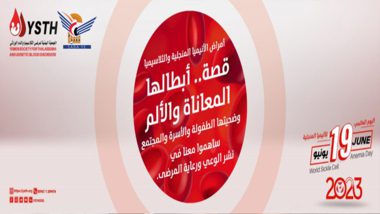Yemen Children’s International Day of Anaemia.. Thick with wounds & pains as a result of aggression & blockade
With the rest of the world, Yemen celebrates World Anaemia Day on Monday, which marks 19 of each year.
The world’s observance of World Anaemia Day comes with severe suffering for patients, especially among children who have not received the minimum basics of health.
Sick children celebrate this day, thick with the wounds and pains caused by the effects of the US-Saudi-UAE aggression and the consequences of the difficulty of patients’ access to medicines and medical supplies.This has led to a higher price and lower purchasing power for patients as a result of economic warfare and difficulty in accessing pharmaceutical items that need special transport conditions.
The President of the Yemeni Thalassaemia Association, Dr. Ahmed Shamsan, told the Yemeni News Agency (SABA) that the occasion came to draw the community’s attention to the support of patients and to intensify health awareness to prevent these chronic genetic diseases.
He said 463 deaths had been recorded as of October, and 700 new cases had been documented last year. He stressed the need to take a decision to reduce the spread of the disease and conduct a prenuptial examination.
Dr. Shamsan described the situation of anaemia patients, tragically as a result of their needs for medication and blood, pointing to the difficulties faced by the association as a result of the increasing numbers of cases of this disease.
According to a report issued by the Ministry of Public Health and Population, 40 thousand people living with sickle cell anaemia are threatened by the lack of medicines due to continued aggression and blockade.
He stressed the importance of increasing community awareness of the importance of prenuptial medical examination to protect generations from the risk of contracting the disease. The aggression and blockade have compounded the suffering of anaemia patients as a result of the prohibition of medication and the difficulty in obtaining it.
According to the report, the organizations do not provide the assistance required for chronic disease patients as well as blood drugs and tests for thalassaemia and hereditary blood patients.
The report indicated that the introduction of medicines was severely hampered by the embargo, which contravened international and humanitarian instruments and laws.
The Ministry of Health called on international and humanitarian organizations working in Yemen to fulfil their responsibilities to continue to support the health sector and focus on supporting chronic genetic diseases.
The aggression States were responsible for the deterioration of the health situation, the high number of deaths and the lack of medicines for thalassaemia and hereditary hemolytic deterioration.
The Ministry of Health’s statement also called on the United Nations and its organizations and bodies to pressure the aggression states to lift the blockade and open the Sana’a airport and the port of Hodeidah in order to save the lives of thalassaemia and hereditary blood patients and to ensure the continued provision of essential and supportive medicines and assistance to patients, especially iron-pulling medicines and hydroxyuria treatment.
It called on the Ministry of Health to support efforts to strengthen safe blood transfusion services for patients, given that the costs of medicines are high for the families of patients, as well as to support efforts to prevent and combat thalassaemia and hereditary blood diseases through the provision of electrical relay devices “Hb Electrophoresis” and solutions to conduct early medical examinations “prenuptial examination”.
Thalassaemia and hereditary dissolution are diseases that are silently prevalent in societies despite their risks, as they are chronic genetic diseases transmitted from genetic parents to children by genetics, characterized by persistent anaemia from several months after birth to the end of life.
Anaemia affects the patient’s complications and blood transfusion needs, spleen and liver enlargement, fragility and abnormalities in the bone and face with the emergence of front teeth, as well as changes in hormones and often impaired growth, the persistent high iron rate as a result of frequent blood transfusions and the persistent degradation of short-lived cells, and the attendant complications on different bodies of the body, may ultimately lead to damage to affected organs, or failure and deficit in the functions of the body’s organs, especially the heart, spleen, liver, kidney and pancreas.

